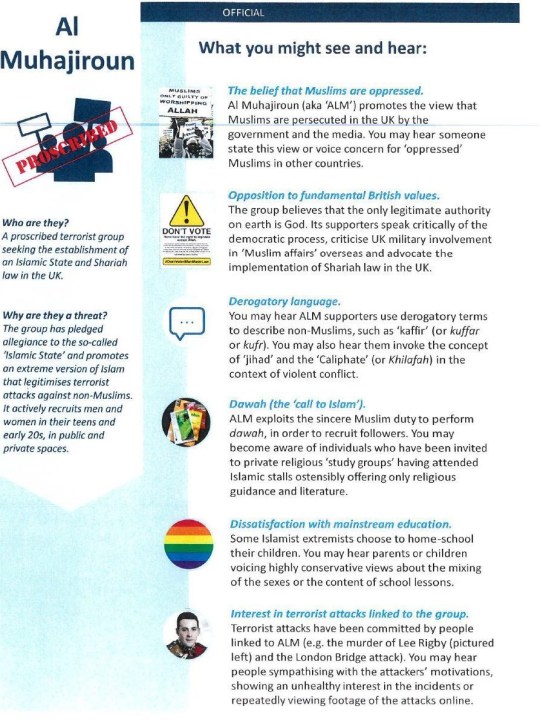Counter terror police in south-east England have issued official guidance suggesting that “Muslims who believe they are oppressed” could be a sign of extremism.
The Metro reports that they issued a 12-page document titled “Safeguarding young people and adults from ideological extremism,” which lists a number of groups and examples of “extremist or worrying behaviour to look for.”
In reference to the banned group Al Muhajiroun the document states: “What you might see and hear: ‘Al Muhajiroun promotes the view that Muslims are persecuted in the UK by the government and media. You may hear someone state this view or voice concern for oppressed Muslims in other countries.”
The guidance was issued as part of the government’s controversial Prevent strategy. Under Prevent, there is a statutory duty for public sector workers to identify those deemed to be at risk of radicalisation.
It also suggested that those who criticise democracy or western foreign policy could be extremists, as could those who oppose LGBT teaching in schools.
The Metro reports that the guidance has since been recalled.
Subscribe to our newsletter and stay updated on the latest news and updates from around the Muslim world!
A spokesperson for Counter Terrorism south east said: “The document was designed for a very specific audience who understand the complexities of the safeguarding environment we work within and who have statutory duties under Prevent.
“We are in the process of confirming who it has been shared with and recalling it. We as Counter Terrorism Policing, along with our partners, have a responsibility to protect vulnerable people. Officers are trained to spot those who may be vulnerable and this is a fundamental element of the work of Prevent – to stop people potentially being drawn into criminal behaviour.”
Human rights group Liberty said it was “outrageous to imply a Prevent referral as warranted where someone expresses the view that Muslims are oppressed.”
Rosalind Comyn, Policy and Campaigns Officer at Liberty, said: “Prevent has always been a blunt instrument that undermines free expression, embeds discrimination in public services and sows distrust among communities.”
And Dr Adnan Siddiqui, director at advocacy group CAGE said: “The inclusion of normative Muslim beliefs, attitudes and experiences of religious discrimination as potential markers is not new to Prevent, and something CAGE has documented and campaigned on for a long time.
“Prevent is not only validating Islamophobia, but is entrenching it across the public sector. The leaked Prevent document seeks to determine which forms of political expression are acceptable, or beyond the pale.”






















